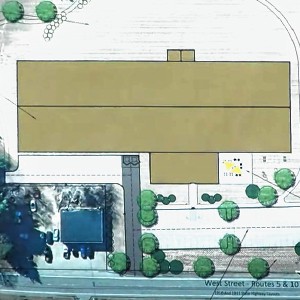First witnesses take stand in Rintala murder trial
| Published: 09-14-2023 12:28 PM |
NORTHAMPTON — Jurors in Hampshire Superior Court heard from the first two witnesses Thursday as prosecutors once more began laying out their case that Cara Rintala killed her wife at their Granby home in 2010.
The two officers first on the scene, Granby Police Lt. Gary Poehler, then a patrolman, and Mark Smith, now police chief in North Brookfield, then a sergeant in the Granby department, recounted how they were dispatched to the 18 Barton St. home just after 7 p.m. on March 29, 2010, and what they found there.
Both said they knew who lived at the residence because Cara and Annamarie Cochrane Rintala, both paramedics, one time had provided medical help at the scene of a bad car accident outside their house. The officers described their work respectively as “fantastic” and “extraordinary.”
Their accounts were illustrated by photos from the scene, showing Cochrane Rintala’s lifeless body, hands over her head, covered in wet paint on the basement floor. Judge Francis Flannery cautioned the jury that the images would be graphic.
Both officers testified that they found Cara Rintala sitting on the basement floor with her wife’s body on her lap, though neither knew at first whose body it was.
“She was saying, ‘I can’t believe she’s dead, I can’t believe she’s dead,” Poehler said.
The officers testified that Cochrane Rintala’s body was rigid, moving as one unit when they helped move her off Cara Rintala’s legs. Her body was cold, they said, and Smith testified that her face was bluish in color.
As he interviewed her at the kitchen table, Poehler said, Rintala told him she had been out with the couple’s 2-year-old daughter, Brianna, and had found the side door open when she returned. After finding Cochrane Rintala’s body, she said, she ran to her neighbor’s house with Brianna and the dog and asked him to call 911.
Article continues after...
Yesterday's Most Read Articles
 Northampton bans auto dealerships near downtown; zone change won’t affect Volvo operation on King Street
Northampton bans auto dealerships near downtown; zone change won’t affect Volvo operation on King Street
 Proposed Hatfield pickleball/tennis building raising eyebrows
Proposed Hatfield pickleball/tennis building raising eyebrows
 South Hadley man killed in I-91 crash
South Hadley man killed in I-91 crash
 ‘Home away from home’: North Amherst Library officially dedicated, as anonymous donor of $1.7M revealed
‘Home away from home’: North Amherst Library officially dedicated, as anonymous donor of $1.7M revealed
 Police respond to alcohol-fueled incidents in Amherst
Police respond to alcohol-fueled incidents in Amherst
 Public gets a look at progress on Northampton Resilience Hub
Public gets a look at progress on Northampton Resilience Hub
She said she then went back into the basement where her wife was lying face down and sat down, pulling her up over her lap.
“She indicated they’d been arguing all morning and the night before,” Poehler said.
She said she had last talked to her wife around 3 p.m. when she told her she was taking Brianna out so Annamarie, a paramedic who had just worked a night shift and was due to work another that day, could get some sleep.
Defense attorney Rosemary Scapicchio asked Poehler whether he had searched the house when he first arrived and what he had done to protect the integrity of the scene. Poehler said he was responding to a domestic disturbance call, and acknowledged that he did not search the house.
Scapicchio also challenged Poehler’s assertion that he had left boot prints on the carpet near Cochrane Rintala’s head after stepping in paint. She argued that someone else could have made the prints.
In her opening argument to the jury of seven men and nine women, Deputy District Attorney Jennifer Suhl drew a vivid picture of Cochrane Rintala drawing her last breath as the hands of her wife squeezed tightly around her neck and ended all the turmoil of an unstable, volatile relationship.
The couple got married in 2007 and soon adopted Brianna, Suhl said. But their verbal and physical battles continued, over work hours, child care, finances.
“The entire relationship was a cause of stress,” Suhl said.
One time, Cochrane Rintala had her wife arrested for assault and took out a restraining order against her. Cara Rintala later told police she had been the assault victim, and Annamarie had “bamboozled her” by getting to the Granby Police first.
Both filed for divorce, and both later drove to Eastern Hampshire District Court seeking restraining orders against the other, Suhl said.
The judge told them to go home.
“He told them, ‘Figure it out or I’ll call child protective services,’” Suhl said to the jury.
Detailing the hours before Cochrane Rintala died, Suhl said she was sending texts on her phone from 8 a.m. to noon, then her phone went silent after 12:21 p.m.
Soon after, an argument between the two of them ended at the bottom of the basement stairs with Annamarie “bloody, hurt and bruised,” in Suhl’s telling.
“Things had gone too far,” she said.
After strangling her wife, according to Suhl, Cara Rintala altered the crime scene, by wiping up blood and staging a break-in. Then she left the house with Brianna, went shopping for small items, and began texting Cochrane Rintala “incessantly” from 5 p.m. on.
After setting the 911 call in motion, Cara Rintala ran back to the basement and dumped a 5-gallon bucket of paint all over before rolling the body on top of her, Suhl said.
Time of death is key to the case. Cara Rintala told police she spoke with her wife around 3, but Suhl said the state medical examiner will testify that Cochrane Rintala was dead long before 3.
In her opening argument, Scapicchio said the whole case started with a lie. The neighbor’s 911 call said nothing about a domestic disturbance, but that’s how the dispatcher called it in.
The police had blinders on throughout the case, Scapicchio said. She said they had overlooked Mark Oleksak, a paramedic who she said was in love with Cochrane Rintala, who opened up three credit cards for her that had accumulated $7,000 in debts by the time of her death.
Scapicchio also introduced Carla Daniele, whom she described as an on-off lover of Cochrane Rintala’s. Both Daniele and Oleksak misled police about their whereabouts that day, she said, and police never pressed them on the inconsistencies
She said there was nothing nefarious about Cara Rintala’s movements that day, and that she cooperated fully with police at her house after the killing.
Cara Rintala “did not have a scratch on her” after supposedly battling and strangling her wife, Scapicchio said.
“Why would she cover up evidence in her own house?” she asked, in regard to the prosecution’s version of events.
In summing up, she accused investigators of “implicit bias” in pursuing her client as their prime suspect.
“Is this a search for the truth?” she asked. “If not, why are we here?”
This is the fourth trial for Rintala. Her first two trials, in 2013 and 2014, ended in hung juries. Rintala was convicted of first-degree murder at her third trial, in 2016, and spent several years in prison before the Supreme Judicial Court overturned the verdict, on concerns about credentials of the commonwealth’s paint expert, and ordered a retrial.
Testimony will resume Friday with defense attorneys questioning Smith.

 State Senate budget funds free community college for all
State Senate budget funds free community college for all ‘We can just be who we are’: Thousands show support for LGBTQ community at Hampshire Pride
‘We can just be who we are’: Thousands show support for LGBTQ community at Hampshire Pride Doors open at Tilton Library’s temporary home at South Deerfield Congregational Church
Doors open at Tilton Library’s temporary home at South Deerfield Congregational Church Area property deed transfers, May 2
Area property deed transfers, May 2
